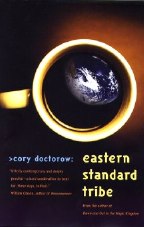Eastern Standard Tribe
Cory Doctorow
Tor
US Hardcover First
ISBN 0-765-30759-6
Publication Date: 03-01-2004
223 Pages; $23.95
Date Reviewed: 02-25-04
Reviewed by: Rick Kleffel © 2004

REFERENCES
COLUMNS
|
|
|
Eastern Standard TribeCory DoctorowTorUS Hardcover FirstISBN 0-765-30759-6Publication Date: 03-01-2004223 Pages; $23.95Date Reviewed: 02-25-04Reviewed by: Rick Kleffel © 2004 |
|
|
REFERENCES |
COLUMNS |
Dilemma is the default tool for the deceptive. "It's just A or B," you're told. "You have to choose." And when confronted with a dilemma, it's easy to succumb. Comforting, really; it's not about choice, but rather lack of choice. While you're looking at A and B the rest of the alphabet goes unnoticed. That's the real point of a dilemma. It's a sort of mutually agreed distraction.
"Smart or happy?" is the dilemma that Cory Doctorow uses to distract the reader in the opening of 'Eastern Standard Tribe'. It's an obvious sleight of hand, a nudge-nudge, wink-wink move in breezy, first person prose that disarms the reader and lets Doctorow get really close. Having ducked under the radar, Doctorow demonstrates his smarts from beginning to end. Only after the covers are closed and you're looking back at the experience do you realize how happy all that smart writing has made you.
'Eastern Standard Tribe' is of the "day-after-tomorrow" sub-genre of science fiction. It's science fiction in that some aspects of science work into the fiction, rather than being a far-flung fantasy of extreme extrapolation. The world Doctorow describes seems more inevitable than imagined. Art Berry is a "user experience" designer and a sort of industrial saboteur. He's working in London, but the company that employs him does not command his loyalty. He's giving them plausible but mediocre advice to advance the aims of his true employer, the Eastern Standard Tribe. While this all sounds quite entertaining, it's also a distraction. The novel unfolds in two simultaneous threads. In the present, Art is trapped on the roof of an asylum where he's been committed as delusional and paranoid. Shortly before this unfortunate turn of events, Art was enjoying his employment as a saboteur, his budding romance with Linda and his friendship with co-conspirator Fede. Alas, the romance and friendship lead not to happiness but to his present problems.
True to form, Doctorow peppers his novel with technology so palpable you want to order it up on the web. You'll probably get the chance. But technology is not the point here, merely a fascinating, convincing backdrop for the story. It's a really old story, actually -- boy meets girl. What follows is not unexpected, or even particularly new. What is unexpected, shocking even, is how smart Doctorow is when it comes to the human heart, and how well he's able to articulate it.
This novel feels whiz-bang modern, but Doctorow's prose uses the oldest trick in the book -- utterly direct simplicity. Even when he's explaining a sophisticated system of mobile music swapping, Doctorow comes off like a standup comedian. The insights he offers seem obvious, but only in retrospect. He seems smart because he makes the reader feel smart. When Doctorow talks, when Art argues, we just get it. There's nothing between the language and the meaning. The prose is funny, simple and straightforward. This is a no-bullshit book.
The excellence, the enjoyability of 'Eastern Standard Tribe' is not just down to Doctorow's sparse prose, or his ability to describe the day after tomorrow. The true joy to be found within this novel rests on Doctorow's understanding of people. That's why the tech is so reasonable. Doctorow's vision of the human heart is as precise as his vision of technology. When Art wants to introduce his new girl Linda to his Gram, he tells Linda, "'She'll love you. She loves anything that's female, of childbearing years, and in my company.'" The novel is filled with this kind of gentle demonstration of high intelligence. Doctorow and his characters avoid the dilemma of "Smart or enjoyable?" The clarity of Doctorow's insights increases their appeal, even when those insights get a bit on the painful side. But there's not a lot of downside in this novel, even when Art is perched on a roof threatening to lobotomize himself with a pencil. The writing reeks of attitude, and it's the kind of attitude that doesn't end up drooling in a depressing tale of woe.
For a novel that's so ultra-hip, and up-to-the-moment, the music swapping enterprise is the only surprise. Yes, Doctorow does put a very clever spin on it. The RIAA should be trying to buy his mind to help them out of the hole they're digging for themselves with regard to their current decisions to sue online music-sharing sites. Still, with the music swapping debate in the newspapers today, wouldn't it be old news to the characters of Doctorow's near future? Of course, that's the point. Once again, it helps to remember that science fiction is not about the future, but rather holding a cracked mirror up to the present. Like the rest of his story, Doctorow offers this speculation in a prose wrapper that's so appealing, you don't really care what product he's peddling. And there it is again: people are the point, not the tech.
Deception is really the name of the game with 'Eastern Standard Tribe'. It uses science fiction, but it's not science fiction. It has science fiction wrapped around its little finger, but it has a global literary agenda. Romance, crime, coming-of-age (belatedly), happy families -- there's a lot here and it all meets the eye, it's all in one ear, then stuck in your brain. Reading Cory Doctorow is going to help you discover that you are smart -- and happy.